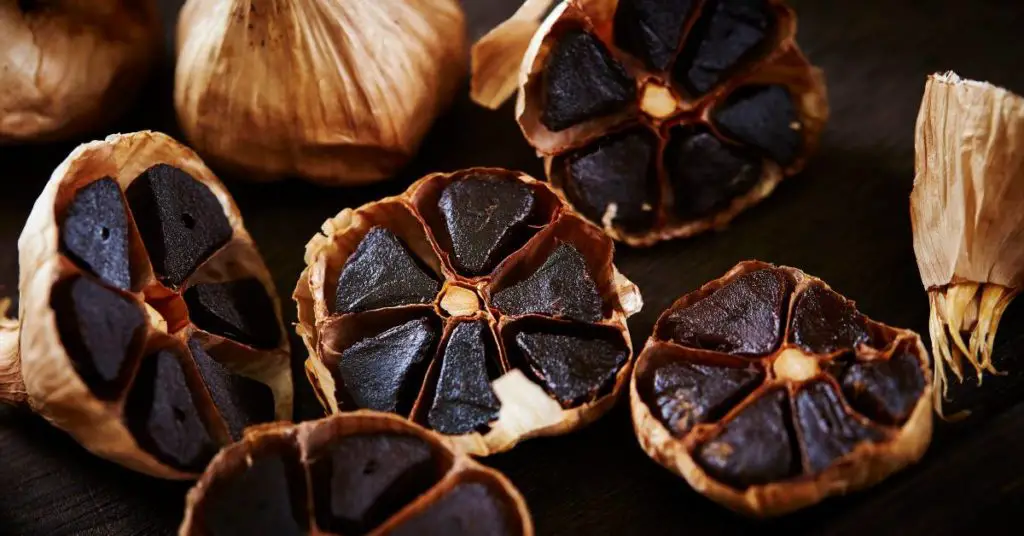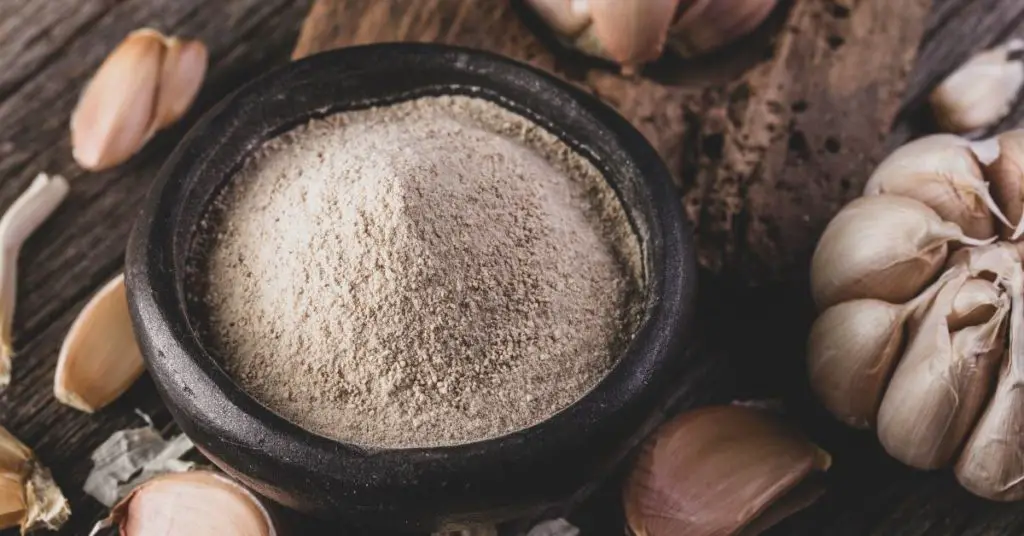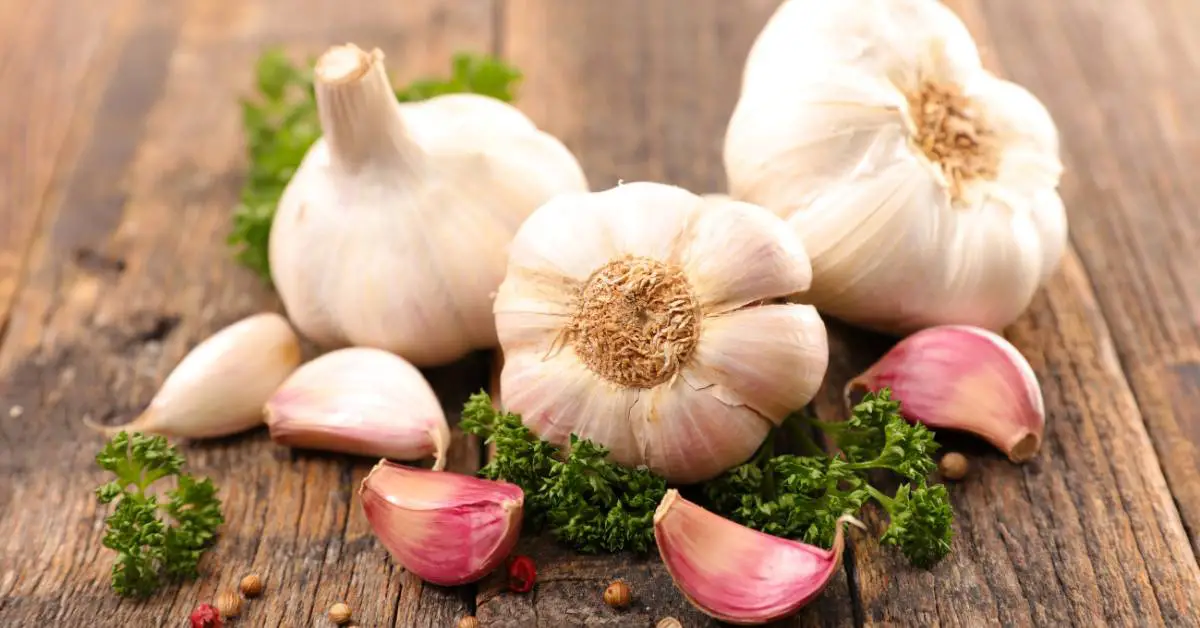Is garlic high in histamine? Let’s dive into this sizzling topic that has been stirring up some confusion in the kitchen and beyond. If you search, you may find opinions about whether garlic is high histamine, but we want to stick with science. Let’s peel away the layers of misinformation and set the record straight!
First, histamine is a compound found naturally in our bodies and in certain foods. Unfortunately, if you have histamine intolerance, you don’t break histamine down as quickly or easily as a person without this condition. Therefore, histamine builds up and causes histamine intolerance symptoms.
The best treatment for histamine intolerance is to avoid eating foods that raise your body’s histamine level. This includes foods that contain histamine and those that cause immune cells called mast cells to release histamine into your bloodstream.
In this article, you can read more about the causes of histamine intolerance. Now, back to garlic and its histamine content.
Is Garlic High in Histamine?
Garlic is known for its pungent aroma, incredible taste, and numerous health benefits. Garlic has been a culinary superstar for centuries, as an ingredient in various cuisines. But people have also used it in holistic remedies.
However, some sources claim that garlic is a high-histamine food, sparking concern if you have histamine intolerance and are trying to manage your symptoms. But don’t be too quick to believe what you read unless it’s a credible source.
The truth is garlic itself is not inherently high in histamine.
In fact, it contains a compound called allicin, which has antimicrobial (3) and has anti-inflammatory properties. Allicin is a sulfur compound that gives garlic its characteristic aroma and some of its health benefits.
A study found that aged garlic extract (AGE) had anti-allergic effects on mast cells and activated T lymphocytes, cells that release histamine. This means that allicin in aged garlic may have beneficial effects for histamine intolerance by reducing histamine release. (2)
Does Garlic Contain Other Biogenic Amines?
Histamine isn’t the only biogenic amine that can cause sensitivity issues for people. Other common biogenic amines in some foods include cadaverine, tyramine, 2-phenylethlamine, spermidine, spermine, and putrescine. (5)
Garlic contains other biogenic amines, but here’s what’s interesting. Studies show that garlic can delay the production of biogenic amines in fermented foods such as Korean salted and fermented anchovy. The addition of garlic during the ripening process of Myeolchi-jeot, a Korean salted and fermented anchovy product, was found to reduce the biogenic amine level by 8.7%. (4)
Therefore, the ability to lower biogenic amines may compensate for any histamine or other biogenic amines in this spice. Therefore, consuming garlic in moderation may not raise your histamine level when you consider the food in its entirety.

Is Black Garlic High Histamine?
Another question you might have is whether black garlic is high histamine. Let’s shed some light on the mysteriously dark and irresistibly aromatic wonder known as black garlic and whether it’s high histamine.
Garlic goes through a magical transformation when it’s aged under controlled conditions of heat and humidity. This aging process can take several weeks, turning the ordinary cloves into something extraordinary.
The result? Black garlic! It boasts a distinctive ebony hue, a soft and sticky texture, and a flavor that’s nothing short of mesmerizing. Black garlic is often described as sweet, tangy, and even slightly reminiscent of balsamic vinegar. Some folks even call it “nature’s caramel.”
However, you may have heard that aged or fermented foods are high histamine and that’s true!
In general, you want to avoid fermented or aged foods, as the bacteria that ferment these foods also produce histamine. Black garlic contains higher quantities of histamine than non-aged garlic.
However, as mentioned, the study above showed that an aged garlic extract reduced histamine release by mast cells. Plus, black garlic contains more antioxidants with anti-inflammatory activity that may offset some of the effects of the histamine in black garlic.
Still, black garlic is something to approach with caution if you have histamine intolerance. Its higher histamine levels could be problematic for some sensitive people, even if the antioxidants offset some of it.
Is Garlic Powder High Histamine?
Garlic powder comes from fresh garlic but it’s dried and ground into a fine powder. Like fresh garlic, garlic powder is usually well tolerated by people with histamine intolerance. Still, always start by using small amounts, just as you would fresh garlic.
Monitor your symptoms by keeping a food journal, so you’ll know how you respond to both fresh and powdered garlic.
Also, be aware that garlic powder is more concentrated than fresh garlic. So, you’ll want to be judicious about how much you add to food.
Plus, some garlic powder contains added salt. Salt isn’t high in histamine, but if you’re like most people, you already get enough sodium in your diet.

Tolerance to Garlic Varies
It’s also worth mentioning that individuals with histamine intolerance or sensitivity may react differently to various foods.
Each person’s tolerance levels can vary, and what triggers a reaction in one person may not affect another at all. It’s a bit like a game of culinary roulette, where everyone has their unique set of rules.
In the grand scheme of things, always approach food and its potential effects on your body with a balanced perspective.
A well-rounded diet that includes a variety of fresh ingredients can provide the nutrients we need while also minimizing any potential histamine-related concerns.
Other Precautions about Garlic
One concern is that garlic contains lectins. (6) If you’re sensitive to lectins, as some people are, the lectins in garlic may stimulate histamine release. This is more of a theoretical concern, as most people tolerate garlic well.
Again, it’s a matter of determining your individual tolerance to garlic. If you have a history of lectin sensitivity, be cautious with garlic and other high-lectin foods.
Be cautious about adding garlic to your food if you take medications or herbs that thin your blood. (7) Garlic is a natural blood thinner and adding garlic to your plate while taking one could increase your risk of bleeding.
Talk to your doctor before eating large quantities of garlic if you take any medications.
Garlic and Histamine Intolerance
Is garlic high in histamine? While it contains allicin, which can release histamine, the levels are generally low. And don’t forget, cooking can significantly reduce the histamine-releasing potential.
As with any dietary concerns, it’s always a good idea to consult with a healthcare professional who can guide you based on your specific needs.
Now that we’ve cleared the air, let the garlic love flow freely in your kitchen! Embrace its flavor, reap its health benefits, and remember, a little garlic can go a long way in adding that extra zing to your favorite recipes.
Happy cooking, folks, and may your meals be filled with deliciousness and joy!
Now, read about high-histamine spices you should avoid.
References:
- Lawson LD, Hunsaker SM. Allicin Bioavailability and Bioequivalence from Garlic Supplements and Garlic Foods. Nutrients. 2018 Jun 24;10(7):812. doi: 10.3390/nu10070812. PMID: 29937536; PMCID: PMC6073756.
- Kyo E, Uda N, Kakimoto M, Yokoyama K, Ushijima M, Sumioka I, Kasuga S, Itakura Y. Anti-allergic effects of aged garlic extract. Phytomedicine. 1997 Dec;4(4):335-40. doi: 10.1016/S0944-7113(97)80043-8. PMID: 23195584.
- Reiter J, Hübbers AM, Albrecht F, Leichert LIO, Slusarenko AJ. Allicin, a natural antimicrobial defence substance from garlic, inhibits DNA gyrase activity in bacteria. Int J Med Microbiol. 2020 Jan;310(1):151359. doi: 10.1016/j.ijmm.2019.151359. Epub 2019 Sep 25. PMID: 31585716.
- Www.Sciencedirect.Com, 2023, https://www.sciencedirect.com/science/article/abs/pii/S0956713508001783. Accessed 5 Jul 2023.
- Naila A, Flint S, Fletcher G, Bremer P, Meerdink G. Control of biogenic amines in food–existing and emerging approaches. J Food Sci. 2010 Sep;75(7):R139-50. doi: 10.1111/j.1750-3841.2010.01774.x. PMID: 21535566; PMCID: PMC2995314.
- Clement F, Venkatesh YP. Dietary garlic (Allium sativum) lectins, ASA I and ASA II, are highly stable and immunogenic. Int Immunopharmacol. 2010 Oct;10(10):1161-9. doi: 10.1016/j.intimp.2010.06.022. Epub 2010 Jul 6. PMID: 20615490.
- “Garlic”. Www.Drugs.Com, 2023, https://www.drugs.com/mtm/garlic.html. Accessed 5 Jul 2023.

